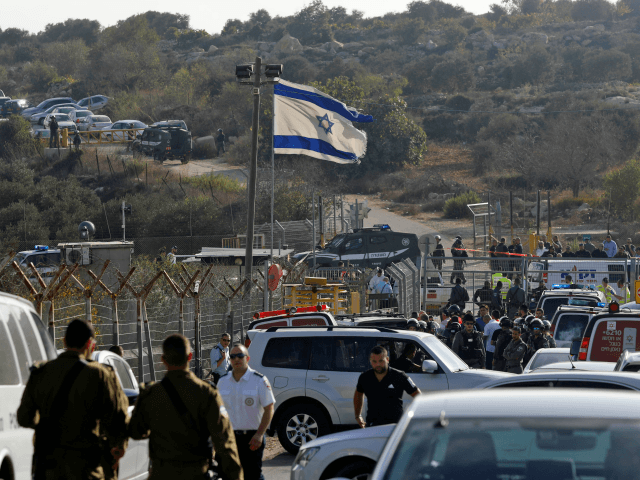TEL AVIV – Residents of Har Adar, where three people were murdered Tuesday by a Palestinian terrorist who was once employed there, are rethinking whether they should continue to employ Palestinians at the settlement.
“While I’d like to think that the Palestinian who has worked for me for the past 11 years is different, I don’t know if he’ll go crazy just like that one did this morning,” Har Adar resident Mor Ben-David told the Times of Israel.
On Tuesday morning, 37-year-old father of four Nimer Mahmoud Ahmad Jamal drew a gun from his shirt and shot at a group of security guards who were opening the back gates of the Har Adar settlement to allow Palestinian laborers to enter. The three victims included border policeman Solomon Gavriyah, 20, and civilian security guards Youssef Ottman, 25, from Abu Ghosh and Or Arish, 25, a resident of Har Adar.
Ben-David declined to disclose her Palestinian cleaner’s identity out of fear for his safety. He hails from Beit Surik, the same village as the murderer close to Har Adar.
“On the one hand, he’s like a member of the family,” Ben-David said. “I want him to come back tomorrow, but events like this definitely carry a lasting impact.”
She added that “People not from here think I’m crazy for hiring him.”
Many of Har Adar’s residents do not identify with the settlement movement per se and only live there because of its proximity to Jerusalem. The Times of Israel reports that the left-leaning Zionist Union won 40% of the votes from Har Adar residents in the 2015 elections.
There are approximately 50,000 Palestinians who work in Israeli settlements, with about 30,000 holding a legal permit from Israel.
Jamal had recently renewed his permit to work for a new family as a cleaner. He was employed by several families in the settlement.
Michal Amidror, who employed him, described him as a “completely normal” and “good-natured” man and said she was in shock when she discovered “that the man who’s been cleaning our house for the past two and a half years was the terrorist.”
Since the attack, critics have been accusing the IDF of security failures in allowing the terrorist to have a permit. Yet Jamal had shown no previous indication of jihadist tendencies. However, it emerged that his wife had fled to Jordan after he beat her. Jamal left his estranged wife a note apologizing for being a “bad husband.” In the message, he expressed hope that she would forgive him for mistreating her. Palestinian terrorists have left similar notes in the past to the families they left behind, expressing hope that their act of martyrdom – and the resulting compensation from the Palestinian Authority – would console the families.
Anat Knafo, 54, who serves on the settlement’s security committee, told the Times of Israel that her family’s relationship with their Palestinian employees was “genuine and humane.”
“I knew of all their family celebrations. When the son of one of my workers was sick, we drove him to the hospital,” she said.
But Knafo was now calling for Palestinian villages in the West Bank to be closed until matters were reviewed. “We don’t know if he worked alone,” Knafo added.
“Part of me is thinking that this is the end of the story and there won’t be peace; but at the same time, I also want Muhammad to return,” she said of her Palestinian employee.
She added that she always sat down with him after terror attacks in the past. “He has entered these conversations with his head lowered. He recognizes that there’s a problem in his community, but has assured me that he is not influenced [by terrorists] like others have been.”
However, other residents weren’t so forgiving. Tali, 45, told the Times of Israel that since firing a Palestinian worker two years ago for allegedly stealing from her, she only employs Jews.
“They hate us. They incite against us from their schools and mosque loudspeakers and then we provide them work permits? It’s nonsense,” she said.
Motti Gross said “most people here don’t think the way” Tali does. “I still wouldn’t think twice before hiring a Palestinian.”
Palestinians employed in the settlements by Israelis earn double what they would make from a Palestinian employer on average, getting around 200 NIS ($57) per day.

COMMENTS
Please let us know if you're having issues with commenting.